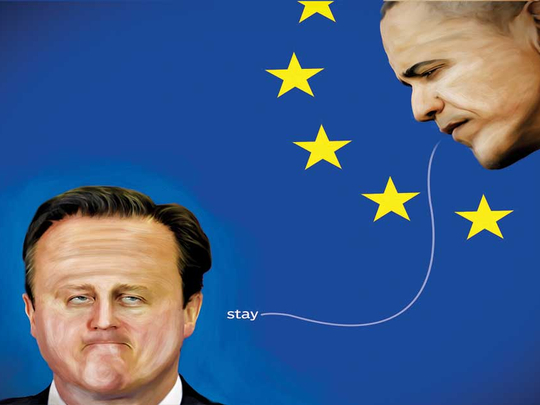
Boris Johnson, the Mayor of London and a leading figure in the campaign to get Britain out of the European Union (EU), recently launched a pre-emptive strike against an expected United States intervention. US President Barack Obama is apparently planning to drop by between now and the referendum in June, to help British Prime Minister David Cameron and his government by saying, not for the first time, that Britain shouldn’t leave.
Johnson writes: “The American view is very clear. Whether in code or en clair, the president will tell us all that UK membership of the EU is right for Britain, right for Europe and right for America. And why? Because that — or so we will be told — is the only way we can have ‘influence’ in the counsels of the nations.
“It is an important argument, and deserves to be taken seriously. I also think it is wholly fallacious — and coming from Uncle Sam, it is a piece of outrageous and exorbitant hypocrisy.”
He has a point about hypocrisy. Remaining a member of the EU involves a substantial, and in all likelihood increasing, surrender of sovereignty to EU institutions — its parliament, executive and supreme court. It’s inconceivable that Obama or any US president would even consider such an arrangement for America. Johnson isn’t exaggerating when he says that the US defends its own sovereignty with “hysterical vigilance”. Yet, Americans typically see British concerns about sovereignty as quaint and beside the point.
Even for a middle-sized country such as Britain — and even for countries a lot smaller than that — sovereignty isn’t a myth or illusion. Economic and geopolitical realities constrain choices and the smaller and poorer the country, the tighter the constraints. But people can still ask, where do those choices, constrained as they may be, reside? Who is making them? It isn’t meaningless to say that Costa Rica has a larger measure of self-government than Kansas.
Putting Britain’s preoccupation with self-government to one side, a quite different question is worth considering. Is Obama right about where American interests lie in all this? Does Britain’s membership of the EU make it a more valuable American ally?
That’s harder to say. In international affairs, Britain is usually aligned more closely with American rather than with European ways of thinking — not just on sovereignty, but also on American leadership, the need for strong national defence, and the use of force in pursuit of global security. At the moment, the view from Washington might be that the United Kingdom can serve US interests in two ways: First, as an ally in its own right; and second, as a spokesman for the American worldview within the EU. Why would America want to see that second role inhibited or ended by ‘Brexit’?
In the short term, that looks correct. For the moment, Britain in the EU gives the US the best of both worlds. But with time, Britain’s obligations to the EU are likely to change. It may never merge into the United States of Europe that some still envisage (Cameron just secured an opt-out from the treaty commitment to “ever closer union”), but closer cooperation out of choice or necessity seems probable, including in foreign affairs. Britain’s pro-American sentiments will presumably persist, but its ability to act as an independent ally may not. With or without full political union, the EU could inhibit the UK’s ability to act alongside the US.
The question would then be, which is more valuable to America — a fairly reliable medium-sized military ally or a EU slightly more inclined, thanks to British influence, to see things the way America does?
The balance could fall either way. A lot depends on how influential in Europe you think the Brits might be, supposing they could put their minds to the task of persuasion and stopped being perpetually at odds with their EU partners. I’m not optimistic on this score. The European project is guided in part by the desire to push back against American power, so resistance to British entreaties on this will be strong. Also, I doubt the Brits will ever settle happily into Europe’s ever-closer union or that the EU will ever stop resenting and resisting Britain’s demands.
I’ve reluctantly concluded that, despite the cost in diminished sovereignty, the UK should stay in the union. This isn’t because the British will ever stop grumbling or feel they belong, but because the alternative to staying in would be a ruinously expensive divorce and that would be worse. Where US interests lie in this choice is harder to judge, but Johnson is right about one thing: Obama may at least pay the Brits the courtesy of understanding their distinctively American ideas about sovereignty.
— Bloomberg
Clive Crook, a Bloomberg View columnist, is a member of the Bloomberg View editorial board.









